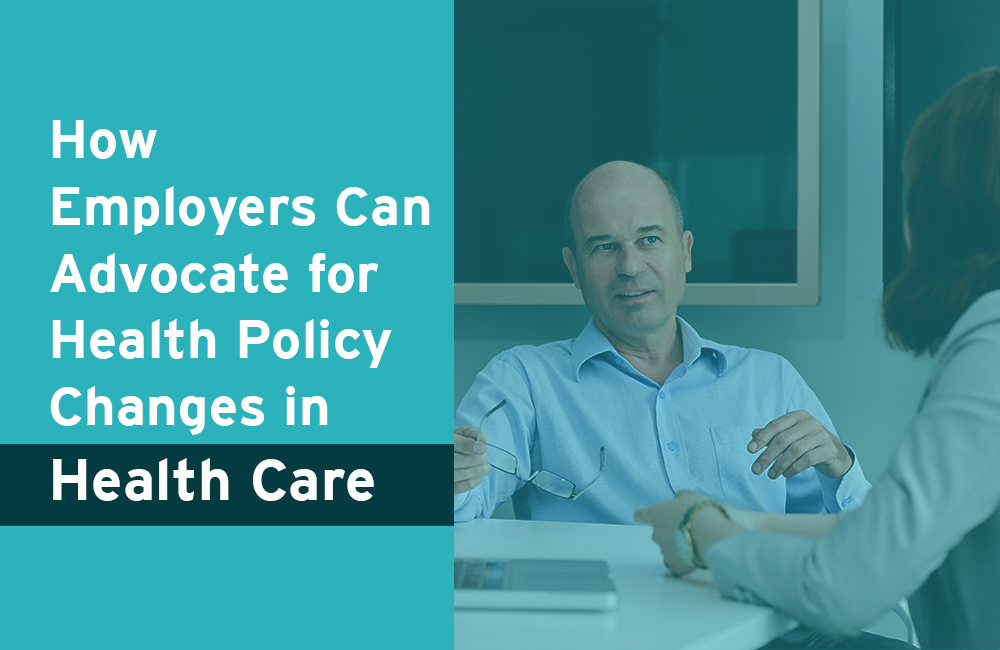
How Employers Can Advocate for Health Policy Changes in Health Care
There’s been a lot of talk about how the health care landscape is shifting due to new federal price transparency rules, but the key to those changes has been advocacy from the business community. Transparency will create better information for consumers and employers to compare price and quality of care while enabling greater accountability for the health care system. Employers are one of the few constituencies who have the influence and motivation to push for these important changes.
Advocacy in Action
A great example of successful advocacy was RAND Corporation’s Hospital Price Transparency Project; employers across the country banded together to submit their health claims data to the study, and its findings were profound.
Commercial payers discovered, among other important facts, they are consistently paying 250%–350% more than Medicare for many of the same services and procedures at the same hospitals. Using this valuable information, The Alliance and other group-purchasers are taking action
Public Pressure Shapes Public Policy
On the back of the Hospital Price Transparency Project, public pressure, especially from the employer community, pushed the White House to issue a slew of executive orders – the first in 2019 – to improve price transparency in health care.
While the effectiveness of these rules has been hampered by enforcement issues (which the government is attempting to address. External Link. Opens in new window.,) they act as a catalyst for future legislative action to end secret pricing – a victory for employers.
However, much work has yet to be done.
Moving Health Care Forward
Health care is incredibly complicated, and its structure – like its pricing – can differ from state-to-state. And while state and federal legislators acknowledge that change is necessary to improve the health care system, they need our help to define those changes. Should we remain silent, we risk becoming victim to good-intentioned, yet unintended and unwanted consequences.
As employers, we need to promote awareness for initiatives we care about by advocating for better health care transparency, pricing, and delivery.
The Voice for Self-Funded Employers
As “the voice for self-funded employers”, The Alliance helps streamline employer efforts and direct them through the most effective channels.– we help our employer-members share their stories with legislators to affect health policy that brings real change in health care.
Using one example, we brought forward three of our employer-members to speak in front of Governor Evers’ Task Force on Reducing Prescription Drug Prices in 2020.
How The Alliance Advocates for Employers
The Alliance uses its wealth of public policy experience to offer multiple channels employers can use to advocate for health policy that’s important to them.
Lobbying
First and foremost, we collaborate with other group-purchasers and partners to promote policy that’s advantageous to our employers.
In 2021 alone, The Alliance has teamed up with Business Health Care Group (BHCG), Common Ground Healthcare Cooperative (CCHG), and its employer-members to meet with over a dozen senators and members of congress to promote, among other items, more funding for the Wisconsin Health Information Organization. (WHIO is the state’s nonprofit All-Payer Claims Database and its utility helps bolster Wisconsin employers’ health transparency efforts.)
The Alliance testifies at public hearings on behalf of our employers, writes and signs-on to letters to legislators, and submits comments on proposed state and federal regulations.
Education & Outreach
Additionally, The Alliance hosts periodic webinars and roundtables to provide information to Alliance members and their consultants on important policy issues and regulatory changes and compliance.
Health Policy Committee
These activities are informed by our Health Policy Committee, which is made up of employer-members of The Alliance. The committee discusses various policy initiatives and helps The Alliance arrive at positions to take. Health Policy Committee members participate in meetings with lawmakers at the state and federal levels to share their stories about how current and proposed health policy measures impact the business community and its employees and family members.
The Alliance extends a standing invitation to its members to join the committee. No prior experience or qualifications are necessary to join – you simply need a desire to learn and affect change in health care.
How to Make Your Voice Heard
How are high health care costs impacting your business or your employees? How does the lack of information about price and quality hinder your efforts to buy health care and/or educate your employees? Have you tried unorthodox and innovative methods to improve your employees’ health care outcomes. External Link. Opens in new window.? We believe every employer has a meaningful story to tell. We can help you find, develop, and present yours to key lawmakers.
- If you’re interested in telling your story, please contact me directly. External Link. Opens in new window..
- If you’re interested in joining our Health Policy Committee, please fill out the registration form.
- To learn more about Health Policy regulation, register for our Health Policy webinar. External Link. Opens in new window. on October 28. Quarles & Brady’s John Barlament will discuss new transparency legislation in 2022 including the: No Surprises Act, Affordable Care Act, Mental Health Parity Report, Employer Shared Responsibility Rule, Advanced EOB Provisions, and other transparency provisions.








